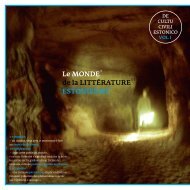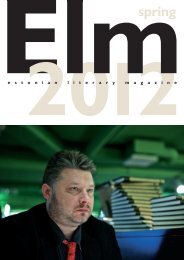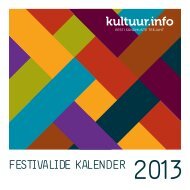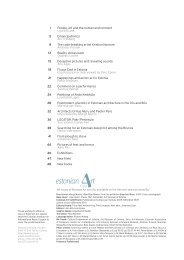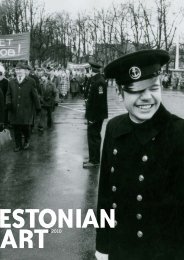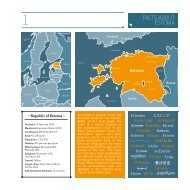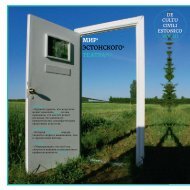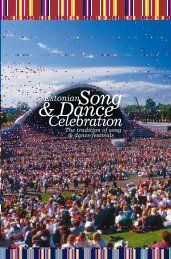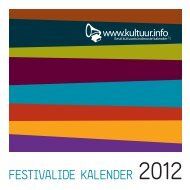Autumn 2013
Autumn 2013
Autumn 2013
You also want an ePaper? Increase the reach of your titles
YUMPU automatically turns print PDFs into web optimized ePapers that Google loves.
often deserved much better. Unfortunately,<br />
very few people seem to understand the<br />
great weight of responsibility borne by<br />
translators – an author’s international<br />
reputation rises and falls with the quality of<br />
the translations of his or her work.<br />
Shortly after returning home to Estonia<br />
from London, I received the Poetry Library’s<br />
monthly newsletter with its list of upcoming<br />
competitions. I was pleased to see that the<br />
Manchester Poetry Prize accepted translations<br />
– very rare indeed for poetry prizes in<br />
the English-speaking world – and I suggested<br />
to Kristiina that we should enter a few of<br />
her poems. I wrote to the organisers to<br />
clarify a procedural point in the rules and<br />
was informed that the translations had to be<br />
done by the author. Now, I know many<br />
poets who have an admirable command of<br />
English as a second language (Kristiina<br />
included), but I have yet to meet one able to<br />
translate his or her own work without<br />
substantial help. The absurdity of this rule,<br />
the utter lack of understanding of the<br />
translation process and indeed belittling of<br />
the translator’s art (for it is an art) by the<br />
organizers of such a prestigious poetry prize<br />
is quite frankly staggering.<br />
Unfortunately, lack of understanding<br />
extends to many translators as well. Some<br />
years ago I took part in an event organised<br />
for literary translators and was truly disheartened<br />
by all the talk of commissions –<br />
among my colleagues at the event this was<br />
by far the most common motivation for<br />
translating an author’s work. It seemed I was<br />
in a rather small minority who chose to<br />
translate a particular writer’s work simply<br />
because we felt an inner need to do so.<br />
Some fundamental questions were<br />
answered on that day. It is often said that<br />
literature in translation doesn’t sell. We have<br />
all at times got dreadfully bogged down<br />
trying to read translations that sound like<br />
translations. But what else can we expect if<br />
the translator doesn’t share the author’s<br />
passion, if the motivation for translating a<br />
poem, a story or a novel does not differ<br />
significantly from that for translating a<br />
business letter, academic paper or<br />
technical report? I must admit that I have<br />
also been guilty of translating a few poems<br />
that I didn’t like. Several years ago an<br />
editor friend was desperate for a translator<br />
and I reluctantly agreed to do the work. I<br />
am deeply ashamed of having done so and<br />
will never do anything like that again. Every<br />
author deserves a translator who is<br />
passionate about translating the author’s<br />
work. A good translation is an expression of<br />
love for the original piece. It is the product<br />
of a spiritual kinship between author and<br />
translator.<br />
There are many different approaches to<br />
translation. Ideally, a translation is done by<br />
someone who is bilingual, with creative<br />
literary abilities and a deep inner desire to<br />
introduce the work of a writer to a wider<br />
audience. In the real world however, in<br />
dealing with the rich and varied literature of<br />
a country as small as Estonia, this<br />
combination of qualities is extremely rare<br />
and very little Estonian literature would be<br />
translated if we dogmatically held to that<br />
principle.<br />
The renowned English poet Ted<br />
Hughes championed translation from literal<br />
English versions and in his case this<br />
resulted in marvellous poems, but I am not<br />
sure that many of them are good translations,<br />
for the simple reason that Hughes’s<br />
own powerful voice resounds throughout.<br />
They are therefore not the author’s poems,<br />
and isn’t that the point of translation – to<br />
recreate the author’s poem, story or novel,<br />
with its own particular music and nuances,<br />
in another language? How can it be the<br />
author’s work if the translator only has the<br />
words to go by and hence can’t hear, and<br />
therefore can’t recreate the author’s voice?<br />
The result may be a very fine work of<br />
literature, but it probably isn’t a good<br />
translation. This approach to translation<br />
has been taken by some translators of<br />
Estonian poetry with varying degrees of<br />
success as regards fidelity to the original.<br />
The increasingly common distinction made




